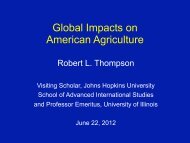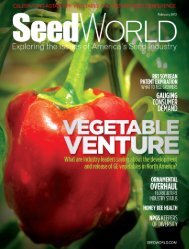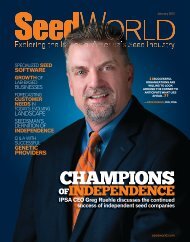Wet Chemistry Soybean Series - Seed World
Wet Chemistry Soybean Series - Seed World
Wet Chemistry Soybean Series - Seed World
- No tags were found...
Create successful ePaper yourself
Turn your PDF publications into a flip-book with our unique Google optimized e-Paper software.
for carrot seed. However, while it lists the pests of concern, itthen proposes to apply the full provisions of Normative 36 tothose pests. There is still no allowance for field inspections andno clarity on seed testing methods. Furthermore, not all of thepests listed are considered to be of scientifically-valid concern.If all imported seed species are regulated with such a normativesystem, Brazil will effectively close its borders.This is clearly not the intent of MAPA; rather the intent mustbe to continue to ensure the safety of all seed imports, and allowlocal farmers and growers to have access to improved seed varietiesapproved for use in Brazil. The international seed associationcommunity is working together to urge governments to negotiatea better process with MAPA. This is a perfect example of theneed for a science-based, globally harmonized seed health system.Progress toward global harmonization is being made. In2009, the North American Plant Protection Organizationestablished a seed panel to draft a regional seed movementstandard. This standard will be sent out for country consultationthis summer. The International Plant Protection Conventionalso added the development of a global seed movement standardinto its work program in 2010. The future of seed is bright, aslong as seed can continue to be safely and efficiently shippedaround the world, providing the basis for global agriculture andfood production. Marc Cool and Ric DunkleEditor’s Note: Ric Dunkle is the senior director for seed health andtrade for the American <strong>Seed</strong> Trade Association and has workedextensively on seed trade issue around the world. Marc Coolis a fifth-generation seedsman with over 20 years of professionalexperience in the seed industry.The regulations should bebased on scientific research.The International Plant ProtectionConventionwww.ippc.intThe North American Plant ProtectionOrganizationwww.nappo.orgThe Agreement on Sanitary andPhytosanitary Measures of the <strong>World</strong> TradeOrganizationwww.wto.org/english/tratop_e/sps_e/sps_e.htm14 <strong>Seed</strong> <strong>World</strong>






